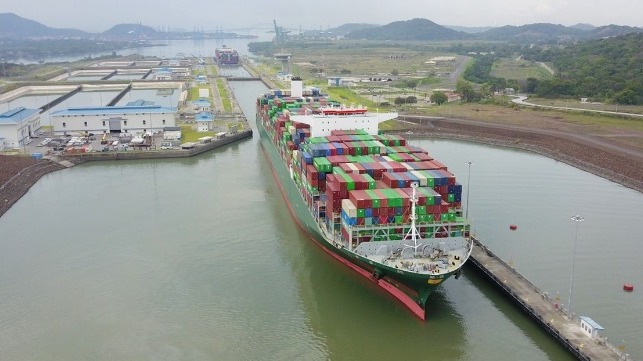Panama Canal Increases Length Capacity to Accommodate Most Boxships

Ahead of the fifth anniversary of its expansion, the Panama Canal Authority announced it has increased the maximum allowable length for vessels transiting the Neopanamax Locks. The increase comes at a critical time when global supply chains have been strained. It means that nearly all (96.8 percent) of the world’s fleet of containerships can transit the Panama Canal, shortening routes and benefiting economies around the world.
“This change was made possible by our team’s experience operating the Neopanamax Locks safely and reliably over the past five years,” said Panama Canal Administrator Ricaurte Vásquez Morales. Since opening the new locks to commercial traffic, the Canal Authority has taken incremental steps to increase the capacity.
Since May 21, the maximum length overall for commercial and non-commercial vessels acceptable for regular transits of the Neopanamax Locks was increased by just over three meters (370.33 versus 367.28 meters) or over 10 feet (1,215 up from 1,205 feet).
The extended capacity to accommodate the longer vessels will provide shipping lines with greater flexibility in making decisions for the deployment, the Panama Canal said in announcing this new policy. They also believe it will play a role in the design and construction of vessels in the future with greater capacity that can transit through the Panama Canal.

that matters most
Get the latest maritime news delivered to your inbox daily.
Before increase the length officially, a series of trial transits were undertaken to confirm the safety of operations. They included the 2019 transit of Evergreen's 369-meter-long (1,210 feet) Triton, which became the largest vessel in dimension and container cargo capacity (14,424 TEU) to transit the Panama Canal since the inauguration of the Neopanamax Locks in June 2016. Since then, other ships with the same dimensions and container cargo capacity have also transited the waterway, including the Talos and Theseus, also 14,000 TEU vessels operated by Evergreen.
In addition to this increased length overall, the Panama Canal also increased the maximum draft permitted to the highest level allowed in the canal. The canal added an additional foot, now permitted vessel with a draft up to 15.24 meters (50 feet). Previously, the level had been maintained at 14.93 meters (49 feet). The draft is subject to rainfall levels on the isthmus and water management at Gatun Lake by the Panama Canal Authority. Last fall, the Panama Canal Authority began seeking bids from international engineering firms for a comprehensive water management system designed to improve the functioning of the canal and secure the nation's drinking water supply.
